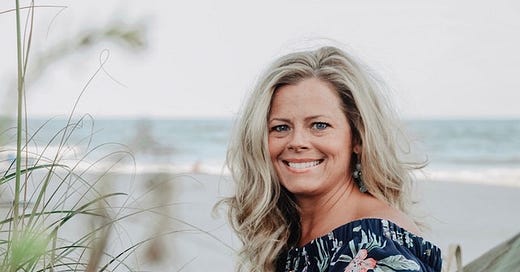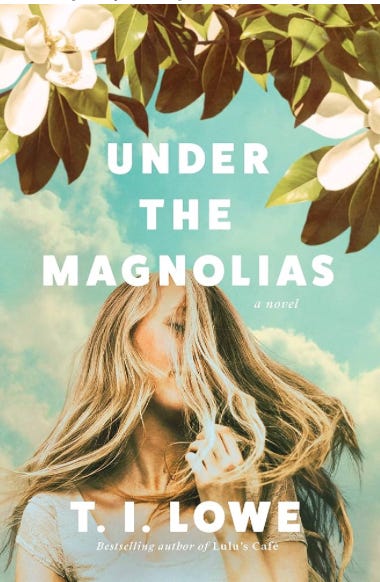Welcome back, friends,
When I embarked on my fiction writing journey a few years ago, I began a search for writers who also wrote contemporary women’s fiction within the Christian industry. One name that surfaced several times along the way was author T.I. Lowe. When Lowe’s Indigo Isle won the Christy Award Book of the Year in 2024, I figured it was high time to pick up one of her novels.
Well.
I read Indigo Isle in a matter of days and was completely taken in with Lowe’s storytelling. I also greatly appreciated that she tackled a difficult topic in a way that reflected reality honestly.
I immediately followed that book with the audio version of Under the Magnolias, and oh my goodness—hands down one of my favorite reads of 2024. I have since read Lowe’s latest release, Lowcountry Lost, and it, too, did not disappoint.
Lowe consistently addresses heavy subjects in her work, but her warmth, humor, and exceptional storytelling balance the darker themes. I also appreciate the diversity of her characters and her ability to connect with readers emotionally. So, I was slightly giddy when T.I. agreed to an interview for Letters and Literature.
A little more about Lowe:
T. I. Lowe is an ordinary country girl who loves to tell extraordinary stories. She is the author of 21 novels, including the #1 international bestseller and critically acclaimed Under the Magnolias and her debut breakout Lulu's Café. Her novel Indigo Isle won the prestigious Christy Award in the contemporary romance category and was subsequently named Christy Award Book of the Year. She lives in coastal South Carolina with her husband and family.
Friends, if you are new to T.I. Lowe, I really can’t recommend her work enough. Whether a new reader or someone familiar with her books, I’m sure you will be blessed by the following interview.
T.I., thank you for joining me here at Letters and Literature. I’m thankful and honored for the gift of your time!
Before we talk about some of your specific work, I’d love to hear a bit about your road to writing. What put you on this path?
Thank you so much for inviting me! I believe my writing path began at birth with storytelling in my root system. For as long as I can remember I’ve always created stories in my head. I didn’t pursue it though. I’m from a small farming community, and so I didn’t think a career in writing was something I could obtain.
My first novel, Lulu’s Café, started with me wanting to understand victims of domestic abuse and why some stay. During the research, Leah’s story came to life. My mom, who was battling cancer, made me promise to share this story. After her passing at only age fifty-eight, it was like a wake-up call. Life is too short to not chase your dreams, and so I kept my promise to her and figured out how to have the book published. That was eleven years ago.
This is such an important truth. The knowledge that life is a vapor, and that there’s only so much time to live intentionally, hits me more and more as I age. How beautiful that your mother’s life and words are intertwined with your author’s journey.
I love that your research brought forth a story that needed to be told. Storyteller roots, indeed! As I mentioned in my introduction, one of the things I admire about your novels is how they address deep issues. Your portrayal of brokenness reflects reality and sheds light on hard topics. For example, Under the Magnolias deals with mental illness. Was this an overarching choice you made as an author, or has it been more of an organic unfolding?
Each book begins with something I want to understand better, and the topic is organic. With Under the Magnolias, a few headlines in 2018 caught my attention. A youth pastor committed suicide in one article. Another headline was of a pastor from a mega church taking his life. I wanted to know why they didn’t feel like they could reach out for help. The more I looked into similar cases, mental illness seemed to be a common factor.
In Indigo Isle, your protagonist deals with sexual abuse and in Lowcountry Lost, your main character is working through the loss of children. What have you found challenging in addressing this kind of trauma in your writing?
The challenge for me is to give the traumatic topic the respect it deserves through research, and also to approach it with empathy. There are dark writing days, and they can get to me, so in order to help myself and my reader through the hard chapters, I make sure to season the story with plenty of well-placed humor. It’s how I get through the hard chapters in real life as well.
Yes! I love that about your novels. Despite the brokenness addressed in your books, they are wonderfully balanced with humor and charm. They are also deeply redemptive. How does faith influence the redemptive threads in your books?
God is the creator of redemption and so I think that just happens organically. While discussing one of my novels in the early stages, my agent asked where faith would come in. I told her I didn’t know exactly, but that’s what is so great about God, he’ll show up and I don’t have to shoehorn him in anywhere.
Absolutely. I think if we love God and are connected to the vine, faith elements flow into our work without forcing them. It’s a byproduct of abiding, just like any other aspect of our lives.
Your work also has incredible emotional resonance. How do you connect with the emotions of your characters, especially your protagonists, as you write?
I make it a priority to get to know my characters long before I sit down to write chapter one. I interview them and keep journals dedicated to them, even my side characters. So, by the time I tell their story, I really do feel like I’m their advocate, their voice.
The fruit of your journaling is evident; your characters always read as complex and layered. I love that you consider yourself their advocate.
I’m curious if tackling harder topics affected your path to publishing—either positively or negatively?
I think if you write from the heart and are passionate about your story, the publishing part will happen when the time is right.
Well, that’s advice every aspiring author needs! Write from the heart. Be passionate about your story. Let publishing happen when the time is right. Wisdom to tuck away, for certain.
What has been the greatest gift in your writing journey?
My readers, who I call my reading friends.
Through emails and also in person at events, when they share their story with me and how my book is similar or has helped them, that is an incredible, humbling gift.
I love that. Being part of a community of readers is such a gift, and how special it must be to know that your books touched someone personally.
Who are some of your personal writing influences? As a Southern writer, what authors or books have been influential specifically in that genre?
Francine Rivers showed me through her stories that it’s okay as a Christian author to write about the hard topics, to be real about them in my fiction. As for my southern roots, Pat Conroy was the king of southern fiction, and I learned from reading his books that it’s perfectly fine to make your reader cry. His stories are deeply emotional. I am also grateful for the talented Charles Martin. I admire his southern style, how he weaves his faith into his stories, and how he highlights broken people but with much heart.
I’ve always admired how Francine Rivers pushed the boundaries in Christian publishing. Coming to faith later in life, she was the first Christian fiction writer whose work resonated with me.
And Pat Conroy—speaking of emotional resonance! I read the Prince of Tides in my early twenties, and I was wrecked by it. It’s a book that is still with me today.
Lastly, please share with us a favorite recent read or favorite book recommendation.
Honey, there are so many! I will say a book that surprised me because it was so good is The Extraordinary Life of Sam Hell. Talk about a roller coaster of emotions. Robert Dugoni will have the reader crying one moment and laughing the next in this heartfelt coming of age story.
I recently read The Storied Life of A.J. Fikry by Gabrielle Zevin about a cranky bookstore owner. Short and sweet and funny and tender, it is now on my favorites list.
I enjoyed The Storied Life of A.J. Fikry immensely! It’s another story that has stuck with me.
Thank you for the Robert Dugoni suggestion, too. I picked up The Extraordinary Life of Sam Hell based on your recommendation and look forward to reading it.
T.I., it’s been a joy to chat with you. I’m such a fan, and I feel privileged to point readers to you and your work. Thank you again for taking the time to be here!
Friends, you can find T.I. Lowe at tilowe.com or on her socials: Facebook (T.I.Lowe), Instagram (tilowe), and X (@TiLowe).
Before signing off, I haven’t forgotten my reader giveaway!
The last post’s gift, The Long March Home, goes to Nicole Mau. I’m so thankful for your presence here, Nicole! Please look for an email in your inbox for details.
And for this week, I’m delighted to give away a copy of T.I. Lowe’s Under the Magnolias. If you are interested, simply respond to this email and type Magnolia in the subject line. New subscribers can do likewise in their welcome email. I compile all entries and a recipient is chosen at random.
Until we meet again, friends, happy reading.
Tiffany







Such a great interview! Her love for God, her characters, and her readers inspires me.
I found myself immersed in your interview with T.I. Lowe and didn't want it to end. Thanks Tiffany, for your thought-provoking questions. I'm adding her books to my reading list.